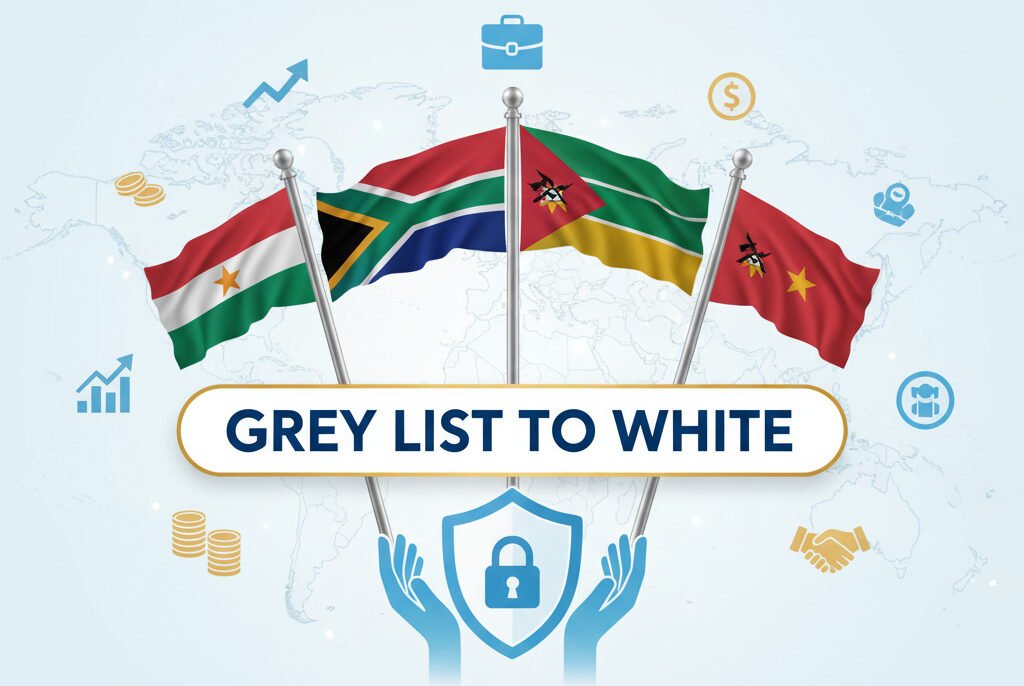In a rare collective victory for African economies, the Financial Action Task Force (FATF) announced the removal of South Africa, Nigeria, Mozambique, and Burkina Faso from its global “grey list” of countries under heightened monitoring for financial crime risks.
The FATF, headquartered in Paris, said the decision followed “successful on-site visits” confirming “positive progress” in addressing systemic weaknesses in anti–money laundering and counter-terrorism financing (AML/CFT) measures.
“This is a positive story for the continent of Africa,” FATF President Elisa de Anda Madrazo said. “Each country has demonstrated concrete reforms and institutional improvements within agreed timelines.”
The move marks a turning point for Africa’s two largest economies, South Africa and Nigeria, whose inclusion on the grey list in 2023 had dented investor confidence and increased scrutiny from international lenders and financial institutions.
From Scrutiny to Stability: How Reforms Paid Off
In South Africa, regulators strengthened oversight of financial institutions and implemented stricter due diligence and reporting obligations to curb illicit transactions.
The country’s Revenue Service Commissioner Edward Kieswetter welcomed the news but warned that “removing the designation is not a finish line but a milestone in building a resilient financial ecosystem.”
Nigeria, which faced mounting international pressure over its compliance gaps, launched a 19-point action plan through its Financial Intelligence Unit, improving inter-agency coordination and introducing digital monitoring systems to track suspicious financial flows.
The First Firm to Assess Your DFIR Capability Maturity and Provide DFIR as a Service (DFIRaaS)
Mozambique and Burkina Faso — smaller but strategically important economies — bolstered their financial intelligence units and supervisory frameworks, with Mozambique expanding data sharing across banking, security, and customs agencies.
“We’re not simply working to get off the list,” Mozambique’s Finance Minister Carla Louveira said earlier this year. “We are working to ensure that by 2030, the FATF will see a completely transformed financial landscape.”
Grey List to White: What It Means for the Four Nations
Countries on the FATF grey list face increased monitoring and reputational damage that can deter investment, raise transaction costs, and limit access to global banking systems. Their removal signals to international markets that compliance standards have improved.
In Nigeria, President Bola Ahmed Tinubu hailed the delisting as a “major milestone in Nigeria’s journey toward economic reform, institutional integrity, and global credibility.”
For South Africa, the exit comes after a series of scandals involving state capture, corruption, and illicit financial flows — issues that prompted the FATF’s initial censure. The new designation could help stabilize investor sentiment and support ongoing credit rating reviews.
Global Context: Who’s Still on the Watchlist
The FATF currently maintains a “black list” of high-risk jurisdictions, which includes Iran, Myanmar, and North Korea — countries identified as failing to cooperate in global AML/CFT efforts.
With this latest decision, the number of African nations under grey-list monitoring has fallen sharply, highlighting progress across the continent in tightening financial controls.
More than 200 countries worldwide adhere to FATF standards, undergoing regular peer reviews to assess compliance. Experts say the delisting could lead to renewed investment flows and improved access to international finance for the four African states.
“The removal is both symbolic and substantive,” said a regional economist in Johannesburg. “It rewards credible reforms — and signals that African institutions are stepping up to global governance standards.”


